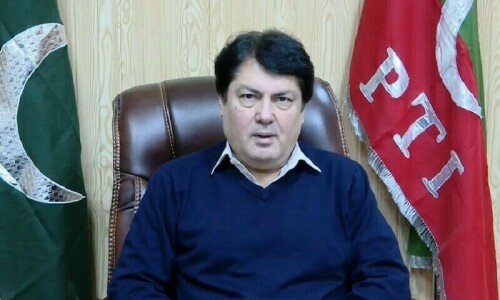As yet another political crisis brews in Pakistan, political discussion and arguments steam through it.
Emotions are high, and arguments equally heated and intense.
For most Pakistanis, any political support must encompass all positions of a party, regardless of personal agreement or disagreement. In other words, support means complete, uncritical and unconditional allegiance; otherwise it's not support.
Either every aspect of that figure, institution or idea has to be backed, or every one of it has to be opposed and hated.
This is no country for nuance.
More on the topic: What is 'naya' in Naya Pakistan?
The political turmoil has pitted PTI right against the PML-N, and any argument tending to oppose Imran Khan’s stance is boxed as Noora support for Nawaz Sharif. Conversely, any support for PML-N — the institution of government and the state — is support for a corrupt Pakistan.
In the midst of all this, one isn't even allowed to acknowledge Asif Zardari’s political acumen and the success of Machiavellian politics without being labeled a jiyala praising PPP’s lacklustre performance.
Suffocation. Congestion. Revolution.
Political opinions, no matter how independent, are refused the luxury to be received without suspicion of political loyalty lurking underneath. Dichotomy, like cancer, has blown up discourse into a monster and everything civil seems to have drowned inside it.
Arguments can now only be bitter and brash, and conversations are incomplete without the usual derogatory words among which are jahil, youthia patwari, noony, anti-Pakistan and even beghairat.
Relations are publicly souring on social media platforms and in lounges and drawing rooms, as civil dignity gets trampled by highly-charged political self-righteousness.
Of course, any support for a party must be based on solid, logical reasons and if it indulges in socially, ethically or politically reprehensible pursuits; it must be condemned. Pakistan’s interest, not personality cults, must direct party support.
But in the current atmosphere, no word against the saints of Raiwind and Bani Gala is brooked.
Read on: Imagine a different Imran
Blind allegiance is making people blind. Things continue to be seen in either black or white. Binaries rule right now and you have no option but to pick one of the two as 'the side you're on'.
As far as issues around women go, any perspective that challenges conservatism on female education, attire or career is characterised as ‘modern’ or ‘liberal’, with negative connotations.
General Zia’s toxic legacy of Islamisation reigns supreme, as people consider any interpretation of Islam apart from their own to be heretical. Even 50,000 slaughtered Pakistanis later, the polarisation and fanaticism continues to manifest itself in our society.
Ideological propaganda continues to indoctrinate students of Pakistan Studies.
History and culture keeps being distorted. The propaganda has been internalised so well and by so many that they now form the very framework of our national discourse. And, any attempt to challenge them is undermined, ignored or haughtily discarded into the dustbin of 'liberal-fascists', 'Westoxified Pakistanis' and 'RAW agents' etc.
All of this spells our penchant for turning into radicals.
Polarisation is not merely a disappointing national phenomenon, it is a dangerous one. After all, it is polarisation which breeds parochial, intolerant mindsets by shunning debate and discussion.
It is one, big, sad picture of intellectual insulation.
Take a look: Why are matters of faith beyond discussion?
The lack of respect for opposing views has created a hostile, suffocating environment for all the people wanting to be heard, understood and respected. This might explain why many segments of the nation such as the Baloch, the Pakhtuns, religious minorities, et al are misunderstood. They are either never heard or their voices hushed to silence.
Arguments and discussions (within the boundaries of civility) are keys to a more pluralistic, open society; and the very heart of democracy itself, which is why polarised attitudes are like cancer at the very heart of Pakistan.
As the state transitions through challenges, so must the people.
Let's, for once, discard the binaries 'good' and 'evil'.
Let's criticise and learn to be criticised.












































